
The prime minister of Iran was a political post that had existed in Iran (Persia) during much of the 20th century. It began in 1906 during the Qajar dynasty and into the start of the Pahlavi dynasty in 1923 and into the 1979 Iranian Revolution before being abolished in 1989.

Amir-Abbas Hoveyda was an Iranian economist and politician who served as Prime Minister of Iran from 27 January 1965 to 7 August 1977. He was the longest serving prime minister in Iran's history. He also served as Deputy Prime Minister and Minister of Finance in Mansur's cabinet. After the Iranian Revolution, he was tried by the newly established Revolutionary Court for "waging war against God" and spreading corruption on earth (Mofsed-e-filarz) and executed.

Jamshid Amouzegar was an Iranian economist and politician who was prime minister of Iran from 7 August 1977 to 27 August 1978 when he resigned. Prior to that, he served as the minister of interior and minister of finance in the cabinet of Amir-Abbas Hoveida. He was the leader of Rastakhiz Party during his tenure as prime minister of Iran.

Hushang Ansary is an Iranian-American former diplomat, businessman, and philanthropist. He served for eighteen years in the Iranian government prior to the Iranian Revolution including as Minister of Economic Affairs and Finance and Iran's Ambassador to the United States from 1967 to 1969. He has been chairman or director of companies both in Iran and in the United States.

Hasan Ali Mansur was an Iranian politician who served as Prime Minister from 1964 to 1965. He served during the White Revolution of the Shah Mohammad Reza Pahlavi and was assassinated by a member of the Fada'iyan-e Islam.

Jafar Sharif-Imami was an Iranian politician who was prime minister from 1960 to 1961 and again in 1978. He was a cabinet minister, president of the Iranian Senate, president of the Pahlavi Foundation and the president of the Iran chamber of industries and mines during the reign of Shah Mohammad Reza Pahlavi.
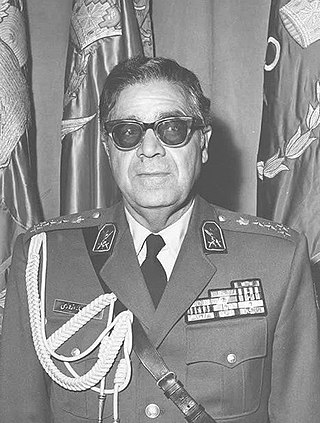
Arteshbod Gholam Reza Azhari was an Iranian military leader who served as the 39th and penultimate Prime Minister of Iran under the reign of Mohammad Reza Pahlavi.

Farrokhroo Parsa was an Iranian physician, educator, and parliamentarian.

Mohammad Reza Pahlavi, commonly referred to in the Western world as Mohammad Reza Shah, or just simply The Shah, was the last monarch of Iran. He began ruling the Imperial State of Iran after succeeding his father Reza Shah in 1941 and remained in power until he was overthrown by the 1979 Iranian Revolution, which abolished the country's monarchy and established the Islamic Republic of Iran. In 1967, he took up the title Shahanshah and held several others, including Aryamehr and Bozorg Arteshtaran .But in the people of Iran and the countries of the world, they called him Shah.
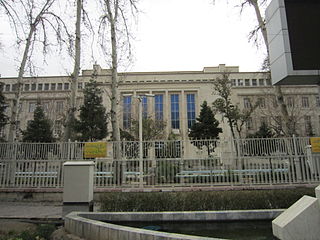
The Ministry of Economic Affairs and Finance's functions are:
Darioush Bayandor is a former Iranian diplomat and official who worked for the government of Shah Mohammad Reza Pahlavi. Following the Iranian Revolution, he left Iran to work for the United Nations in the 1980s and 1990s before retiring to Switzerland where he writes and consults.
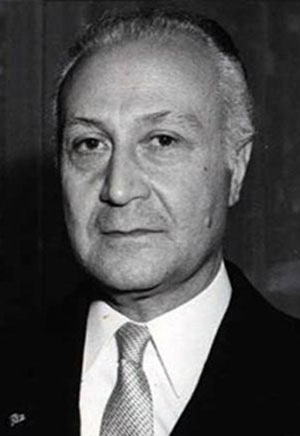
Abbas Ali Khalatbari, also known as Abbas Ali Khal'atbari, was an Iranian diplomat, who served as the minister of foreign affairs from 1971 to 1978. He was among the significant diplomats who shaped the foreign relations of Iran during the reign of Mohammad Reza Pahlavi. He is one of the Shah era politicians who were executed following the Iranian Revolution.
Events from the year 1977 in Iran.
Reza Azimi was a senior military officer during the reign of the Shah Mohammad Reza Pahlavi. He was a general and held various military and government posts, including commander of the Imperial Iranian Ground Forces and minister of war.
A by-election was held in September 1974 to fill the vacant seat for Shahsavar in the National Consultative Assembly, the lower house of the Imperial State of Iran.
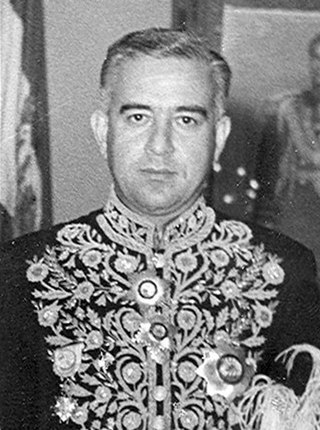
Abdolreza Ansari (1925–2020) was an Iranian engineer, bureaucrat and politician who held various government posts. He served as minister of labor (1959–1960) and minister of interior (1966–1969).
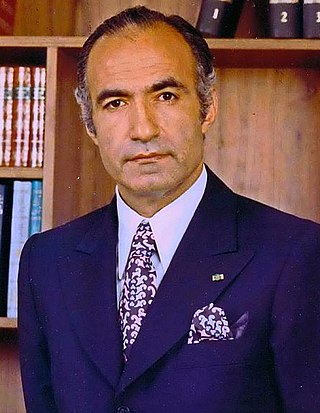
Gholamreza Kianpour was an Iranian politician and minister of justice in the government of Amir-Abbas Hoveyda and Jamshid Amouzegar between 9 November 1976 and 17 August 1978.

Eskandar Azmoudeh was a Lieutenant-general and one of the senior Iranian soldiers in the Pahlavi period
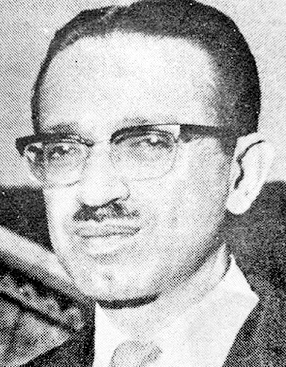
Safi Asfia was an Iranian mining engineer, technocrat and politician who held several cabinet posts during the reign of Shah Mohammad Reza Pahlavi. He was arrested in 1979 when an Islamic revolution took place in Iran and was imprisoned for five years. Following his release Asfia did not leave Iran and was involved in computer programming.

The cabinet led by Jamshid Amouzegar was announced on 7 August 1977. It succeeded the last cabinet of Amir-Abbas Hoveyda who submitted his resignation on 6 August. Major goal of Amouzegar's cabinet was to implement a new liberal economic program to stop inflation. The cabinet significantly decreased the annual financial aid given to mosques and religious organizations which had very negative effects on the relations between the state and religious establishment.
















